|
|
|
Sort Order |
|
|
|
Items / Page
|
|
|
|
|
|
|
| Srl | Item |
| 1 |
ID:
148593
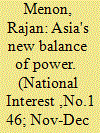

|
|
|
|
|
| Summary/Abstract |
SEEN IN historical perspective, a Western-dominated world represents a recent phenomenon. Not until the fifteenth century did the gap between the West and the rest start widening dramatically, with the Industrial Revolution, which followed much later, serving as the critical accelerator. For centuries before that, the centers of cultural splendor, wealth and scientific achievement lay in the East. Asia accounted for nearly 60 percent of global economic output as recently as 1700. Its position declined steadily thereafter, but started regaining ground in 1980. China’s remarkable post-1978 economic resurgence, along with rapid growth in South and East Asia, ranks among the most significant changes in the international system in the last three decades. This does not necessarily betoken the West’s marginalization. Still, the change in Asia’s relative standing has ended the long era of unrivaled Western preponderance—and the trend will persist.
|
|
|
|
|
|
|
|
|
|
|
|
|
|
|
|
| 2 |
ID:
148586
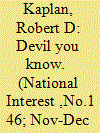

|
|
|
|
|
| Summary/Abstract |
A PRINCIPAL tenet of realism is that disorder is worse than injustice, since injustice merely means the world is imperfect, whereas disorder can mean there is no justice for anyone. President Bashar al-Assad of Syria has tested this thesis to an unbearable extent. The degree of injustice he has perpetrated can be equated with crimes against humanity. Hundreds of thousands have been killed in a half-decade-old civil war, both ignited and perpetuated by Assad’s regime—not to mention the millions of refugees and regional chaos his rule has spawned in the Middle East and Europe. But an excruciating fact confronts us: it does not necessarily follow that his departure would improve the situation, at least at this juncture. Syria, to put it mildly, is in great disorder. Assad’s abdication could both deepen and broaden that disorder, if it has any effect at all.
|
|
|
|
|
|
|
|
|
|
|
|
|
|
|
|
| 3 |
ID:
148591
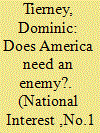

|
|
|
|
|
| Summary/Abstract |
IN THE first century BC, the Roman historian Sallust wrote that the republic had descended into internal strife because of the destruction of its enemy, Carthage, in the Third Punic War. Fear of the enemy, or metus hostilis, produced domestic cohesion. Without an adversary, Romans turned their knives inward: “when the minds of the people were relieved of that dread [of Carthage], wantonness and arrogance naturally arose.”
|
|
|
|
|
|
|
|
|
|
|
|
|
|
|
|
| 4 |
ID:
148590


|
|
|
|
|
| Summary/Abstract |
THE HOUSE of Saud may be attempting to modernize its economy, but the gulf between U.S. and Saudi values and national interests is deepening. The divide in values is stark, but it should not obscure the divide in interests—most notably, the role that the Saudi government has played in promoting those very interpretations of Islam that have wreaked havoc across the Middle East and world. A reassessment of the benefit and terms of this alliance is overdue. The Saudi government’s egregious human-rights record has been ignored by a long line of American administrations of both parties in favor of maintaining intelligence sharing, access to oil markets and the joint goal of countering Iranian regional ascendency. This willingness to ignore the actions of the Saudi government toward its own citizens in favor of preserving the status quo has shaped America’s diplomatic relationship. Nothing could be more mistaken.
|
|
|
|
|
|
|
|
|
|
|
|
|
|
|
|
| 5 |
ID:
148592
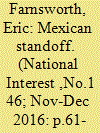

|
|
|
|
|
| Summary/Abstract |
A U.S. PRESIDENTIAL candidate publicly claimed that Mexico is a land of criminals, drug traffickers and rapists; rather than being forced to withdraw, he was rewarded with his party’s nomination. Is it any wonder that for generations, Mexican policymakers saw fit to define themselves in opposition to Washington? After the Mexican-American War, when the latter dispossessed the former of its vast lands north of the Rio Grande, bilateral relations historically were cool and formalistic, overlain by Mexico’s skepticism of the United States and an acute sense of sovereignty. Family and economic ties kept the relationship vibrant at local and regional levels, but the state of the official relationship was well captured by former president Porfirio Díaz, who reportedly lamented, “Poor Mexico [is] so far from God [and] so close to the United States.”
|
|
|
|
|
|
|
|
|
|
|
|
|
|
|
|
| 6 |
ID:
148588
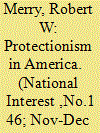

|
|
|
|
|
| Summary/Abstract |
IN LATE August 1985, while President Ronald Reagan vacationed at his ranch above Santa Barbara, California, his political director, Ed Rollins, had dinner one Saturday night with reporters for the New York Times and Washington Post. The mischievous politico leaked a story that received front-page treatment Monday morning. President Reagan had decided, the newspapers reported, to reject the pleas of U.S. shoe manufacturers for import tariffs designed to protect them from foreign competition. No big surprise there. Reagan was known as a fervent free trader, hostile to tariffs and other barriers to global commerce.
|
|
|
|
|
|
|
|
|
|
|
|
|
|
|
|
| 7 |
ID:
148587


|
|
|
|
|
| Summary/Abstract |
WHEN THE Cold War ended a generation ago, much of the Western foreign-policy elite asserted that nationalism was in decline. Old-fashioned national liberation movements were increasingly irrelevant; in a world with a single global economy, it didn’t really matter where borders were drawn. And if every country was going to be a liberal, individualistic democracy, whether the country’s population was dominated by a single ethnicity or made up of many different ethnic groups would not matter. The nation-state might not vanish entirely, but it would be largely dissolved by the two acids of economic globalism and liberal individualism. “Ever closer union” was expected to be the trend, not only in the European Union, but also in the world.
|
|
|
|
|
|
|
|
|
|
|
|
|
|
|
|
| 8 |
ID:
148589


|
|
|
|
|
| Summary/Abstract |
JOHN J. MEARSHEIMER, the distinguished University of Chicago political scientist, argued in the National Interest two years ago that Taiwan had almost no hope of maintaining de facto independence. China, he made clear, will grow so strong in the coming decades that it will, as a regional hegemon, be able to evict the United States from East Asia, dominate its periphery and, one way or another, absorb the island that lies a mere hundred miles from its shores.
|
|
|
|
|
|
|
|
|
|
|
|
|
|
|
|
|
|
|
|
|